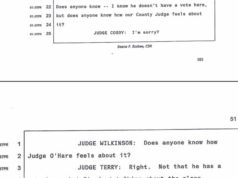Tarrant County officials recently announced that local law enforcement can participate in a program that was authorized in 2007 by state lawmakers. Known as cite and release, the program allows peace officers to issue citations for low-level offenses that would normally require processing in Tarrant County Jail, which gained statewide attention for more than 20 jail population deaths last year.
“The decision to make a custodial arrest or utilize the cite and release program remains at the discretion of the investigating officer,” the Fort Worth police department said in a public statement. “Additionally, it does not prevent prosecution of offenses. It only provides another method through which a crime can be prosecuted.”
The process for prosecuting alleged offenders remains the same, according to county officials, meaning locals who are caught in possession of small amounts of marijuana will still face charges that most other district attorneys nationwide no longer accept, including the DA in that big city 45 minutes east. Dallas County DA John Creuzot announced in 2019 that his office would no longer prosecute first-time possessions of marijuana, a plant that nearly 30 states have decriminalized.
“Although African Americans and people of other races use marijuana at similar rates, in Dallas County, African Americans are three times more likely to be prosecuted for misdemeanor marijuana possession than are people of other races,” Creuzot said in a public statement in 2019. “After arrest, African Americans are assessed money bond at a higher rate for marijuana possession and are assessed higher bond amounts than other races. African Americans are more likely to be convicted of marijuana possession once charged and are more likely to serve a jail sentence. The District Attorney must take action to end that disparity. To that end, I have declined prosecution on misdemeanor possession of marijuana cases for first-time offenders.”
Bexar, Dallas, Harris, and Travis counties have already enacted cite and release policies.
“Tarrant County is unbelievably late to the party,” said Diana Claitor, co-founder and communications director for the Texas Jail Project, a nonprofit that empowers Texas county jail populations. “When you look at what cite and release has done across the country, in terms of the amount of people you save from going to jail and the amount of money saved, it’s phenomenally successful for the most part. I’ve lost count of the number of times I’ve had to talk to a mother of someone who was arrested for criminal trespass who then kills themselves. It is beyond ridiculous that we feel this driving need to incarcerate, incarcerate, incarcerate.”
Claitor said that being arrested and jailed for a minor offense can be traumatizing, especially for people experiencing a mental health crisis. While county officials have worked to increase the issuance of personal recognizance (PR) bonds that do not require fees upfront, hundreds of pretrial defendants remain trapped in county jail simply because they cannot afford to pay a bail fee of as little as $100 (“Cashing Out,” Oct 2020).
The cite and release program, if coupled with a commitment to stop over-policing Black and brown communities, could lead to a fairer application of the law for Tarrant County residents of all backgrounds.
“What the cite and release program does is lessen the burdens on our officers by reducing the time spent on minor/nonviolent offenses,” read the Fort Worth police statement. “This allows them to get back into service more quickly, better serve our citizens, and spend more time addressing violent crime.” — Edward Brown












